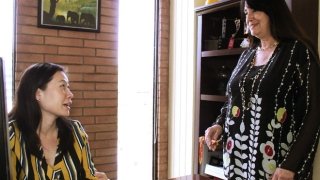As an arbiter of issues facing students, Jessica Gibson wants everyone to feel heard
Two-dozen USC Rossier faculty and staff have gathered in a classroom under Waite Phillips Hall, listening to techniques about conflict resolution.
At the front of the room, two university staff members help attendees learn how to listen and understand student concerns. Christine Street from USC Student Affairs, and Quade French from the USC Office of Campus Wellness and Crisis Intervention, have been invited to do this presentation at USC Rossier by Jessica Gibson, the school’s assistant dean for student services, as a way to improve how students get their frustrations heard and addressed.
Gibson’s job is to provide resources and training for program office staff to be able to serve a wide array of student needs, balancing the holistic demands of students with a role as enforcer of USC Rossier’s standards and expectations.
The assistant dean for student affairs position was created in Fall 2016 to provide guidance and consistency of student services across academic programs, according to Kathy Stowe, the associate dean for academic programs.
“Distinguishing the roles of academic program development and student affairs has allowed for a faster resolution of concerns and initiatives,” Stowe said.
Gibson describes her role as “listening ... and looking for a creative way for everyone to move forward successfully, for both sides to arrive at a solution.”
Toward student affairs
Gibson began her USC career as a development officer for USC Libraries. Successive stints at Yale and USC Marshall brought Gibson more into student services. When USC Rossier underwent a major reorganization in 2003, Provost Professor Shaun R. Harper, then the chair of the EdD program, recruited Gibson to be associate director for the program.
All those experiences ultimately led to her current position.
“We needed someone who was truly interested in the experiences of all of our students, who could partner with faculty in creating an effective and equitable learning environment, and who had both a knowledge of institutional policy and practice and a willingness to question it,” Stowe said. “Jessica was an ideal candidate.”
By the time that cases are escalated to Gibson, they’re supposed to have already gone through a student’s academic adviser and the program coordinator. (For students in an online program run by 2U, there’s an even earlier step involving student success advisers.) Gibson is the last step before a case, if appealed again, goes to the USC Office of Equity and Diversity.
Student enrollment is almost evenly split between on-ground and online students, and Gibson estimates that the complaints she hears from students are split mostly evenly as well, with a slight lean toward online.
Many of the problems she deals with are reactionary: Students who want to appeal grades, or appeal a dismissal request related to plagiarism, or who have experienced an identity threat—perhaps marginalization by a professor or a peer, or an incident covered under Title IX.
In proactive periods, she’s helping staff with professional development and serving USC Rossier in several university roles, such as Academic Integrity Coordinator.
But the core of her job, Gibson says, is to prevent students from feeling alienated by the school.
“Students want to feel that they are treated equitably and with compassion in and out of the classroom,” Gibson said, “and to know that we care about them.”




